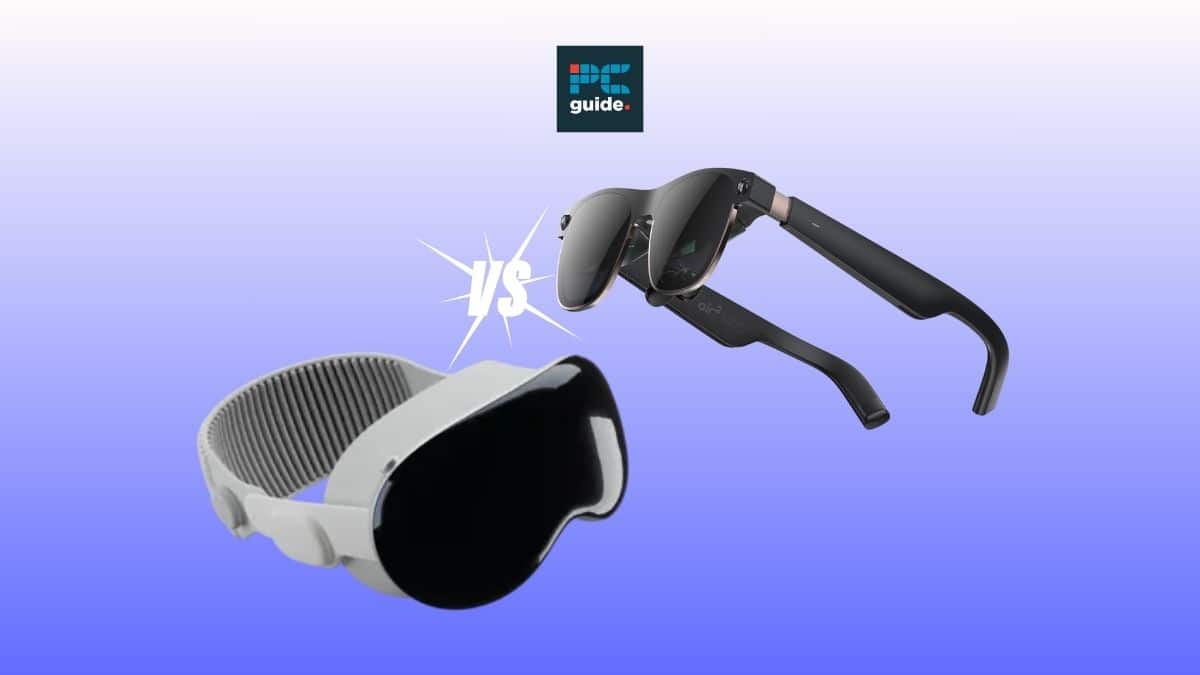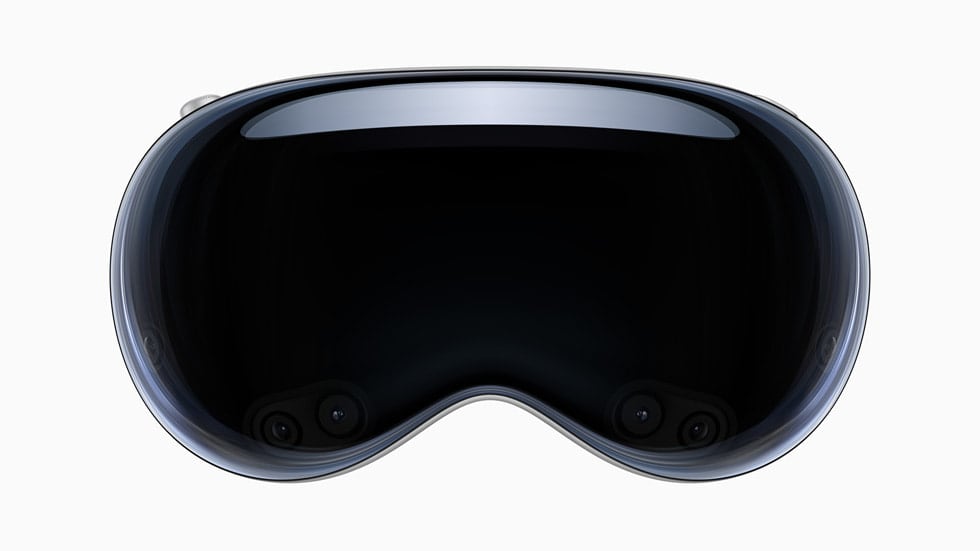Apple Vision Pro vs Xreal Air 2 Ultra – how are they different?

Table of Contents
In the rapidly evolving world of augmented reality (AR), two major players have emerged with their latest offerings: the Apple Vision Pro and the Xreal Air 2 Ultra. These advanced AR glasses are designed to provide users with immersive experiences and redefine spatial computing. In this article, we will explore the features and capabilities of both devices to determine which one is the better choice. Keep reading to see our comparison of the Apple Vision Pro vs Xreal Air 2 Ultra.
If you’re keen to find out more about VR headsets, check out our Apple Vision Pro headset review round-up or our Meta Quest 3 vs Apple Vision Pro comparison guide.
Apple vision Pro vs Xreal Air 2 Ultra – Specs at a glance
| Specifications | Apple Vision Pro | Xreal Air 2 Ultra |
|---|---|---|
| Processor | M2 chip, R1 chip | Snapdragon |
| Display resolution | 4K per eye | 1920 x 1080 per eye |
| Refresh rate | 90Hz, 96Hz, 100Hz | 120Hz |
| Display type | Micro-OLED | Micro-OLED |
| Weight | ~ 1.1 pounds | 0.18 pounds |
| Controllers | Hand, eye, and face tracking | Hand and face tracking |
Apple Vision Pro – specs and features
The Apple Vision Pro is a highly ambitious mixed-reality headset that aims to revolutionize the way we interact with digital content. With its sleek design and powerful hardware, the wearables offer a wide range of features that make it a compelling option for users seeking an immersive AR experience.
Today's best deals
- Intel Core Ultra 245K - 15% OFF NOW!
- ASUS ROG Swift PG32UQXR - $200 OFF NOW!
- Yeyian Yumi RTX 4060 Gaming PC - $500 OFF NOW!
- SAMSUNG 990 PRO 4TB SSD - 35% OFF NOW!
- Sony X77L 4K Smart TV - 16% OFF NOW!
- Samsung Galaxy Tab A9+ - 29% OFF NOW!
- WD_BLACK 8TB SN850X SSD - 32% OFF NOW!
*Stock availability and pricing subject to change depending on retailer or outlet.
Design and comfort
The Vision Pro boasts a futuristic design with a high-tech pair of goggles-like appearance. The 3D-formed glass and aluminum alloy frame give it a sleek and polished look. The Light Seal, which sits between the headset and the user’s face, ensures a comfortable fit with no light leakage. The flexible headband and the easy-to-use dial for tightening, producing eye comfort, and a customizable wearing experience
Immersive entertainment
For entertainment purposes, the Vision Pro provides a truly immersive experience. Users can watch movies and TV shows on a virtual 100-foot-wide screen with 4K resolution and Spatial video/audio. The headset supports 3D movie playback, making the viewing experience even more captivating. Additionally, the Vision Pro enables users to capture and view photos and videos on a life-size scale, with the capability to capture spatial content.
Power and battery life
The Vision Pro is powered by the M2 chip and a dedicated R1 chip for real-time processing. The micro OLED panels offer crisp visuals with better-than-4K resolution. However, the device requires an external battery pack, which has a relatively short battery life of around 2 hours. Users will need to recharge the battery pack frequently to continue using the headset.
Xreal Air 2 Ultra – specs and features
The Xreal Air 2 Ultra is Xreal’s latest addition to its Air glasses lineup, aiming to compete with industry giants like Apple and Meta. With its advanced features and sleek design, Air 2 Ultra glasses promise to deliver a compelling alternative for developers and consumers seeking an immersive AR experience. It is available for pre-order now and will start shipping in March.
Design and lightweight construction
The Air 2 Ultra features a sunglasses-style form factor with a 52-degree field of view, offering users a wide visual experience. The titanium package weighs only 80 grams, making it lightweight and comfortable to wear. The front layer of the glasses supports three electrochromic dimming levels for increased immersion without the need for a physical shield.
Spatial tracking and hand control
One of the key highlights of the Air 2 Ultra is its 6DOF (six degrees of freedom) spatial tracking and hand tracking capabilities. This allows virtual objects to seamlessly integrate with the real world, providing users with a truly immersive experience. The dual 3D cameras on the glasses enable environment mapping and enable developers to build apps that blend physical and digital space.
Power and connectivity
Unlike standalone mixed reality headsets, the Air 2 Ultra relies on compatibility with external computing units such as smartphones, computers, or Xreal’s Beam module. This flexibility allows users to connect the glasses to a range of devices, including Samsung Galaxy smartphones, iPhones, and Mac or Windows machines. Xreal’s Nebula AR environment provides the necessary software support for these connections.
Is the Xreal Air 2 Ultra better than the Apple Vision Pro?
Both the Apple Vision Pro and the Xreal Air 2 Ultra offer advanced features and immersive AR experiences. The Vision Pro stands out with its sleek design, powerful hardware, and intuitive interface. It excels in productivity, communication, and entertainment, providing users with a wide range of use cases. However, its high price of $3,500 may deter some potential buyers.
On the other hand, the Air 2 Ultra offers a competitive alternative at a more affordable price point of $699. Its impressive spatial anchors and developer-focused features, make it an attractive option for developers and early adopters. The lightweight construction and comfortable design add to its appeal.
Do I need an iPhone for Apple Vision Pro?
Unlike the Xreal Air 2 Ultra, the Apple Vision Pro does not require an external phone or device for charging. You can set up your Vision Pro entirely on its own all you need is a WIFI connection. The only point where you might consider pairing your phone with your headset is to transfer your data using Quick Start.
Apple Vision Pro vs Xreal Air 2 Ultra – Wrapping up
The choice between these two products is entirely dependent on your preferences. Both the Apple Vision Pro and the Xreal Air 2 Ultra harness some of the best technology available on the market at the minute, so deciding between them mainly comes down to budget. The Apple Vision Pro is on the higher end while the Xreal Air 2 Ultra has a relatively low asking price. Therefore, the comparison of these two impressive pieces of kit boils down to budget and if the abilities of the products justify the price.


